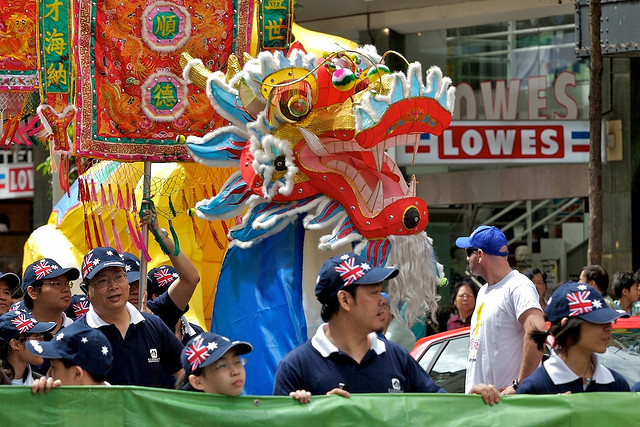
Australia’s referendum tick for the monarchy and constant
opinion poll support for the US alliance suggest the voters are happy with both the traditional and treaty elements of the Anglosphere. The temperature of popular sentiment must carry weight in
The Strategist's discussion of the significance of the Anglosphere, but I suspect that few Australians would reach for 'The Anglosphere' as their preferred term to describe our present situation or future strategic choices.
Sentiment always counts, and often glitters on the surface, but it can conceal a much larger seam of pragmatic Oz self-interest. The hard-headed view of self-interest is one constant in an Australia that's changed dramatically since Elizabeth II took the throne in 1952. Looking back, it’s legitimate to observe—in the
words of Tony Abbott’s former Jesuit teacher—that in the earlier versions of the Australian nation, ‘the English made the laws, the Scots made the money, and the Irish made the songs’!
The jest needs updating in the Australia revealed by
the 2011 census, where Mandarin is the second most common language after English. Others in the top ten ‘Languages Spoken at Home’ include Arabic, Cantonese, Vietnamese, Hindi and Tagalog. The Australian home has become a place of many languages. The new version of the Jesuit quip might be that China drives the Oz mining boom while all manner of Chinese Australians bloom; the Vietnamese drive the roads but Vietnamese medicos also drive the hospitals; the Indians drive both the trains and the law—and everybody runs the restaurants. The range of languages to be found round an average Oz kitchen table lessens the power of the Anglosphere as a cultural frame that Tony Abbott can use to talk to voters. Worse than Abbott’s worry about the Anglosphere provoking Pavolvian responses, it might rate as an irrelevance. No wonder Abbott has vowed to stop talking about the Anglosphere.
As I
argued in the previous column, the Anglosphere is a medal that Abbott will have to wear, for good or ill, in the way he is viewed beyond Oz. Within Australia, the medal will do him no great harm because of the relatively positive views about monarchy and US Marines and many other Australian habits of mind. No harm, though, doesn't mean it will help Abbott electorally. The diverse range of Australians who also speak Mandarin or Hindi or Tagalog might view the Anglosphere as another of those bits of the Oz psyche that make the place both unique and amusing. Examples of these Oz peccadilloes include having a head of state who lives on the other side of the world, the local habit of shooting and eating the animal which also hops along as the national symbol and being so multi-cultural that we have four codes of football.
In any discussion like this, I often reach for one of my favourite quotes from the leading Asian scholar, Wang Gungwu, who embraced Oz (and burnished Australia’s standing) by taking Australian citizenship. As Professor Wang observed twenty years ago, Australia's liberal history gives it something special to contribute to the region: 'Paradoxically, what Australians value about their culture: the law, the respect for human rights, the parliamentary system, which are not features of Asian societies, are what attract Asians’. That attraction's reflected in the diversity of peoples who have embraced Oz, peccadilloes and all.
There are two sorts of people in the world: those who like to divide the world into two and those who don’t. For the sake of
The Strategist discussion of the Anglosphere, let us do some ‘two sorting’. This debate can be divided in lots of ways: as a discussion of both modes of order and competition; or of aspects of both grand strategy and geo-economics; but the sharpest way to posit two halves of the Anglosphere is to see it as fundamental to the international Rules of the Road (as
Peter Jennings did) and, secondly, to see the distinctly Anglosphere Ways of War.
On the Rules of the Road side of the divide, Oz voters would probably reach beyond the Anglosphere to adopt more common terms such as liberal internationalism, globalisation or capitalism. These other terms all carry large amounts of baggage, but though they may be deeply Anglo in flavour, they at least don’t have Anglo on the label. When we turn to the other half—to geostrategy or Ways of War—the discussion and the stakes really get pointed and come to the fundamental point; this is the sharp point of the slashing semantic swordplay between
Hugh and
Peter.
The demographer
Bernard Salt spends a lot of time studying the Australian psyche. I point to his argument that Australians today don't consider themselves to be the victims of ‘the tyranny of distance’ in the same way as earlier generations. The emotional ties to England and the cultural cringe have faded. What still worries Australians, he argues, is ‘Empty Island syndrome’.
Salt writes that the Empty Island fear is that we're a small nation in charge of a big empty continent, and that makes us both lucky and vulnerable:
Australians, I think, are united across space and time, including centuries, by the abiding notion that we are modest in number and we live on a big and empty island. Indeed Empty Island Syndrome delivered our early and lingering cultural cringe and deference to Britain, the US and Europe.
Empty Island syndrome throws some light on why asylum seekers sailing into Australian waters have caused such an extraordinary neuralgia in the Oz body politic. And if we're united across centuries, then the Anglosphere still offers some interesting thoughts about Australia’s future approach to Ways of War in the Asian Century—the subject for the next column.
Graeme Dobell is the ASPI journalist fellow. Image courtesy of Flickr user Brian Yap (葉). Print This Post
Print This Post